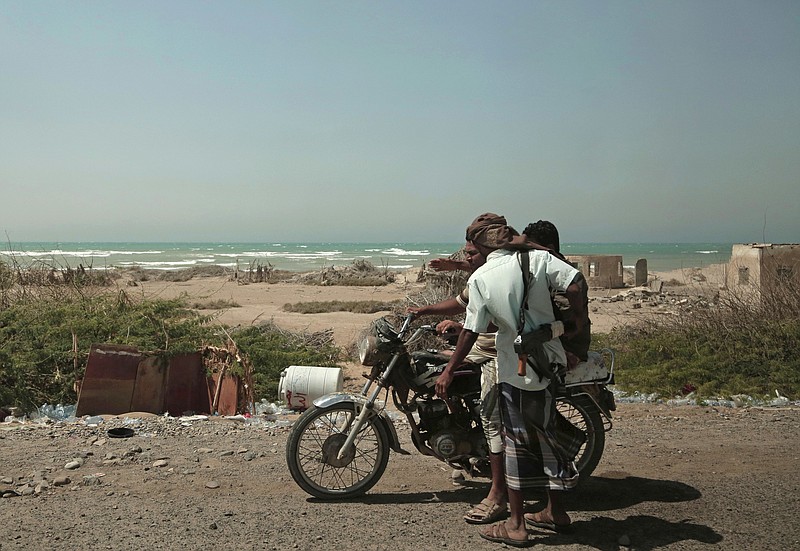DUBAI, United Arab Emirates (AP) — The Saudi-led coalition backing Yemen’s exiled government launched a fierce assault Wednesday on the crucial port city of Hodeida, the biggest offensive of the years-long war in the Arab world’s poorest nation for the main entry point for food in a country already teetering on the brink of famine.
The attack on the Red Sea port aims to drive out Iranian-aligned Shiite rebels known as Houthis, who have held Hodeida since 2015, and break the civil war’s long stalemate. But it could set off a prolonged street-by-street battle that inflicts heavy casualties.
The fear is that a protracted fight could force a shutdown of Hodeida’s port at a time when a halt in aid risks tipping millions into starvation. Some 70 percent of Yemen’s food enters via the port, as well as the bulk of humanitarian aid and fuel supplies. Around two-thirds of the country’s population of 27 million relies on aid and 8.4 million are already at risk of starving.
Before dawn Wednesday, convoys of vehicles appeared to be heading toward the rebel-held city as heavy gunfire rang out. The assault, part of an operation dubbed “Golden Victory,” began with coalition airstrikes and shelling by naval ships, according to Saudi-owned satellite news channels and state media.
Bombardment was heavy, with one aid official reporting 30 strikes in 30 minutes.
“Some civilians are entrapped, others forced from their homes,” said Jolien Veldwijk, the acting country director of the aid group CARE International, which works in Hodeida. “We thought it could not get any worse, but unfortunately we were wrong.”
The initial battle plan appeared to involve a pincer movement. Some 2,000 troops who crossed the Red Sea from an Emirati naval base in the African nation of Eritrea landed west of the city with plans to seize Hodeida’s port, Yemeni security officials said.
Emirati forces with Yemeni troops moved in from the south near Hodeida’s airport, while others sought to cut off Houthi supply lines to the east, the officials said. They spoke on condition of anonymity as they weren’t authorized to brief journalists.
Yemen’s exiled government “has exhausted all peaceful and political means to remove the Houthi militia from the port of Hodeida,” it said in a statement. “Liberation of the port of Hodeida is a milestone in our struggle to regain Yemen from the militias.”
The Houthi-run Al Masirah satellite news channel later claimed rebel forces hit a Saudi coalition ship near Hodeida with two missiles. Houthi forces have fired missiles at ships previously.
The Saudi-led coalition did not immediately acknowledge the incident. The U.S. Navy’s 5th Fleet, whose area of responsibility includes the Red Sea, referred questions to the Pentagon, which did not immediately respond to a request for comment.
Forces loyal to Yemen’s exiled government and fighters led by Emirati troops had neared Hodeida in recent days. The port is some 150 kilometers (90 miles) southwest of Sanaa, Yemen’s capital, which has been in Houthi hands since September 2014. The Saudi-led coalition entered the war in March 2015.
The United Nations and other aid groups already had pulled their international staff from Hodeida ahead of the assault.
The port remained open, with supplies arriving. Several ships have arrived in recent days, including oil tankers, and there has been no word from the coalition or the U.N. to stop work, according to a senior port official, who spoke on condition of anonymity because he was not authorized to talk to the media.
Aid groups nevertheless warned of disaster.
Robert Mardini, the regional director for the Red Cross, said the push on Hodeida “is likely to exacerbate an already catastrophic humanitarian situation in Yemen.”
“The population has already been weakened to extreme levels,” he said.
David Miliband, the head of the International Rescue Committee, called the offensive “an attack on the political and diplomatic process to bring peace to Yemen.” He said the U.N. Security Council must act to secure a cease-fire before the people of Hodeida “suffer the same fate as those in Aleppo, Mosul or Raqqa.”
Over 10,000 people have been killed in Yemen’s civil war, which has displaced 2 million more and helped spawn a cholera epidemic. Saudi-led airstrikes have killed large numbers of civilians and damaged vital infrastructure.

